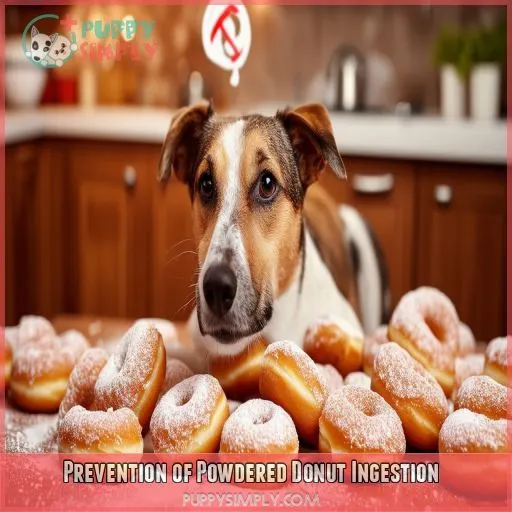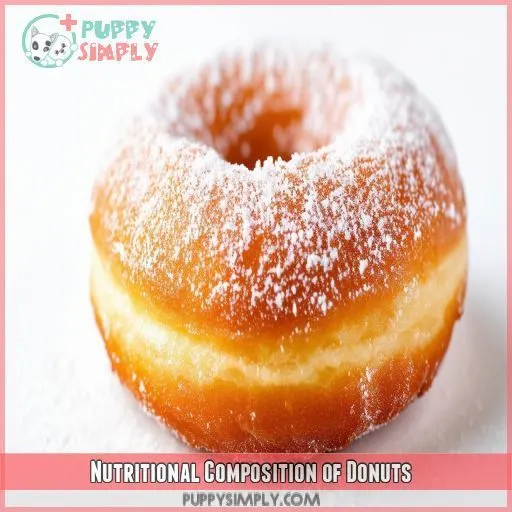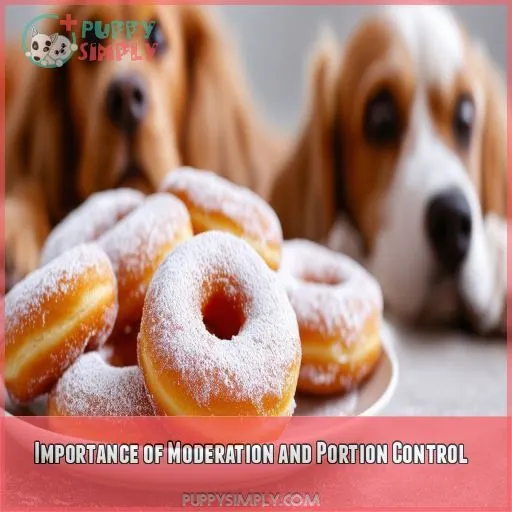This site is supported by our readers. We may earn a commission, at no cost to you, if you purchase through links.

Powdered donuts are packed with ingredients that can lead to diabetes, heart disease, and pancreatitis in dogs. They’re high in sugar and fat, which dogs struggle to metabolize.
If your pup sneaks a bite, watch for symptoms like vomiting, diarrhea, or unusual behavior. In case of ingestion, contact your vet immediately. They may need to induce vomiting or provide other treatments.
To keep your dog safe, store donuts out of reach and opt for dog-friendly alternatives instead.
There’s much more to examine when it comes to dogs and human treats.
Table Of Contents
- Can Dogs Eat Powdered Donuts?
- Health Risks of Powdered Donuts for Dogs
- Symptoms of Powdered Donut Ingestion
- Expert Advice on Treatment
- Prevention of Powdered Donut Ingestion
- Consequences of Donut Consumption by Dogs
- Types of Donuts and Their Effects on Dogs
- Donut Holes
- Dog-Friendly Donut Alternatives
- Nutritional Composition of Donuts
- Importance of Moderation and Portion Control
- Frequently Asked Questions (FAQs)
- What happens if my dog eats donuts?
- What kind of donuts are safe for dogs?
- Can dogs eat little Debbie powdered donuts?
- Can my dog have a cinnamon sugar donut?
- Can dogs eat powdered donuts?
- Can dogs eat Glazed Donuts?
- Can dogs eat Dunkin Donuts?
- Can dogs eat donut holes?
- Are donuts bad for dogs?
- Can dogs eat fried Donuts?
- How long does it take for symptoms to appear?
- Can dogs develop an addiction to powdered donuts?
- Are there any long-term effects of occasional donut consumption?
- Do different dog breeds react differently to powdered donuts?
- Can powdered sugar alone cause problems for dogs?
- Conclusion
Can Dogs Eat Powdered Donuts?
NO, dogs shouldn’t eat powdered donuts as they pose significant health risks, including diabetes, heart disease, and pancreatitis, due to their high sugar and fat content, as well as potential toxicity from chocolate and artificial sweeteners like xylitol. It’s best to keep powdered donuts out of reach and opt for dog-friendly alternatives instead.
Health Risks of Powdered Donuts for Dogs
Powdered donuts pose serious health risks to your dog, including diabetes, heart disease, and pancreatitis due to their high sugar and fat content. Chocolate donuts are especially dangerous, containing toxic ingredients for dogs, while some powdered donuts may include xylitol, an artificial sweetener that’s harmful to canines.
Diabetes, Heart Disease, and Pancreatitis Risks
You’ll want to keep those powdered treats away from Fido. The high glycemic index and sugar substitutes in donuts can wreak havoc on your dog’s digestive system. It’s not just a sugar rush; we’re talking potential diabetes, heart disease, and pancreatitis. Trust us, dog poisoning isn’t a walk in the park.
Chocolate Donuts Contain Toxic Ingredients
Chocolate donuts are a no-go for your furry friend. They contain theobromine and caffeine, toxic ingredients that can wreak havoc on your dog’s health. Even small amounts can lead to serious complications. When in doubt, keep those chocolate treats out of Fido’s reach!
Xylitol, an Artificial Sweetener, is Harmful to Dogs
While chocolate’s a known threat, artificial sweeteners like xylitol in donuts can be just as dangerous for your furry friend. This sugar substitute, found in some baked goods, can cause:
- Rapid insulin release
- Severe hypoglycemia
- Liver failure
Always check ingredients to keep your pup safe.
Symptoms of Powdered Donut Ingestion
If your dog has eaten powdered donuts, watch for symptoms like vomiting, diarrhea, seizures, hyperactivity, or lethargy. These signs can indicate your pet is experiencing adverse effects from the ingestion and may require veterinary attention.
Vomiting
If your dog ingests powdered donuts, watch for vomiting. It’s a sign of stomach upset and can lead to dehydration. Offer water and monitor closely for other symptoms of indigestion or pancreatitis.
Diarrhea
Your dog might experience diarrhea after munching on powdered donuts. It’s not just a messy situation; it’s a sign of digestive issues. Watch for loose, watery stools and dehydration.
Seizures
While diarrhea’s unpleasant, seizures are a more severe concern. You might notice your pup shaking uncontrollably or losing consciousness. Don’t panic—seizure management is critical. Contact your vet immediately for guidance.
Hyperactivity
After your pup gobbles powdered donuts, watch for sudden bursts of energy. They might zoom around like they’ve hit the doggy jackpot, thanks to the sugar rush from those tasty treats.
Lethargy
After the sugar rush, your dog might crash hard. Watch for lethargy, weakness, and fatigue. They may lose their appetite and have pale gums. These signs warrant veterinary attention.
Expert Advice on Treatment
If your dog has consumed powdered donuts, veterinary experts recommend inducing vomiting and administering activated charcoal to prevent further absorption of harmful substances. It’s essential to provide fluids and electrolytes, administer anti-seizure medication if necessary, and monitor your pet for several hours to guarantee their safety and recovery.
Induce Vomiting
If your dog’s eaten powdered donuts, inducing vomiting might be necessary. Here are five vomiting induction methods:
- Hydrogen peroxide solution
- Salt water
- Mustard solution
- Gentle physical stimulation
- Syrup of ipecac (vet-approved only)
Always consult your vet before attempting these techniques.
Administer Activated Charcoal
After inducing vomiting, you’ll need to administer activated charcoal. This over-the-counter treatment helps absorb toxins in your dog’s system. Here’s what you should know:
| Step | Action |
|---|---|
| 1 | Consult vet |
| 2 | Calculate dose |
| 3 | Mix with food |
| 4 | Administer orally |
| 5 | Monitor closely |
Provide Fluids and Electrolytes
After your pup’s powdered donut adventure, hydration is critical. Provide fluids and electrolytes to prevent dehydration and maintain equilibrium. Here’s what you need to know:
- Offer small, frequent sips of water or pet-safe electrolyte solutions
- Monitor urine output to ensure proper fluid management
- Consult your vet for specific electrolyte replacement recommendations if symptoms persist
Administer Anti-seizure Medication
If your dog experiences seizures after eating powdered donuts, you’ll need to administer anticonvulsant therapy. Consult your vet immediately for proper seizure management and emergency treatment options.
Monitor for Several Hours
After administering medication, you’ll need to monitor your dog closely. Keep a watchful eye for:
- Changes in behavior
- Recurring symptoms
- Improvement signs
Stay vigilant during this critical follow-up care period.
Prevention of Powdered Donut Ingestion
Keep powdered donuts out of your dog’s reach, and never intentionally feed them to your pet. If your dog does ingest a powdered donut, contact your veterinarian immediately.
Keep Out of Reach
Keep your powdered donuts out of your furry friend’s reach. Safe storage is key to pet safety. Here’s a quick guide:
| Location | Safety Level |
|---|---|
| High cabinets | Very safe |
| Refrigerator | Safe |
| Countertops | Risky |
| Coffee tables | Dangerous |
| Floor | Very dangerous |
Do Not Feed to Dogs
Don’t give your furry friend powdered donuts, no matter how much they beg! These sugary treats aren’t part of a healthy pet diet. Stick to dog-friendly snacks to keep your pup’s tail wagging and their health in check.
Contact Veterinarian Immediately if Ingested
If your dog ingests powdered donuts, take immediate action:
- Call your vet for emergency care
- Provide details on quantity consumed
- Follow their instructions precisely
Don’t delay – your pet’s safety depends on swift veterinary intervention.
Educate Children About Dangers
You’ve called the vet, but don’t forget to teach your kids about the dangers of sharing donuts with Fido. Explain how sugar consumption affects dogs differently, emphasizing healthy snacking for both pets and children.
Consequences of Donut Consumption by Dogs
If your dog consumes donuts, you should watch them for signs of indigestion or diarrhea, as the high fat content can be difficult for them to digest. In severe cases, pancreatitis, a painful and potentially fatal condition, can develop.
Indigestion or Diarrhea Due to Difficulty Digesting Fat
Your dog’s pancreas may struggle with the high fat content in donuts, leading to indigestion or diarrhea. Sugar spikes and tooth decay are also concerns. Opt for dog-friendly treats instead to keep your furry friend’s tummy happy.
Pancreatitis, a Painful and Potentially Fatal Condition
You’ll want to watch out for pancreatitis if your pup scarfs down donuts. This nasty condition inflames the pancreas, causing severe pain and potentially fatal complications. Symptoms include vomiting, abdominal pain, and loss of appetite. Prompt treatment is essential.
Begging for More Donuts
After experiencing pancreatitis, your dog may develop a donut craving. To prevent pet obesity and sugar addiction, implement these dog training techniques:
- Redirect attention
- Offer healthy alternatives
- Use positive reinforcement
Stick to dietary restrictions to keep your furry friend healthy.
Monitor for Stomach Upset and Avoid Extra Treats
After your pup’s donut escapade, keep a close eye on their tummy troubles. Resist those puppy-dog eyes begging for more treats. Stick to their regular diet and consider healthy alternatives to satisfy their donut cravings while meeting canine dietary needs.
Types of Donuts and Their Effects on Dogs
Glazed donuts pose health risks for dogs due to their high fat, sugar, and empty calorie content, which can lead to obesity and related issues. Chocolate donuts are even more dangerous, containing toxic ingredients that can cause severe illness or even death in dogs if consumed.
Glazed Donuts: High in Fat, Sugar, and Empty Calories
Glazed donuts might look tempting, but they’re a no-go for your furry friend. These sugary treats are packed with fat, sugar, and empty calories that can wreak havoc on your dog’s health.
The high donut quality you enjoy comes at a cost for your pup. With sky-high calorie counts and fat content, glazed donuts pose serious health risks, including obesity and diabetes.
It’s best to keep these sweet indulgences for yourself and opt for dog-friendly alternatives instead.
Chocolate Donuts: Toxic Ingredients for Dogs
While glazed donuts are unhealthy, chocolate donuts pose a more serious threat to your furry friend. They contain toxic ingredients that can be fatal for dogs. Here’s why you should keep chocolate donuts away from your pup:
- Theobromine toxicity
- Caffeine content
- High sugar content
- Artificial sweeteners
These components can lead to severe health issues, including weight gain, dental problems, and even life-threatening conditions. Remember, concerning your dog’s health, it’s better to be safe than sorry.
Donut Holes
You might think donut holes are safer for your furry friend due to their smaller size, but don’t be fooled. These bite-sized treats pack the same punch as their full-sized counterparts in relation to donut hole toxicity. Here’s what you need to know about donut hole safety:
- Size doesn’t matter: Donut holes contain the same harmful ingredients as regular donuts.
- Sugar overload: Their compact size can lead to rapid sugar consumption.
- Choking hazard: The small, round shape poses a potential choking risk.
- Ingredient concerns: Some may contain xylitol or chocolate, both toxic to dogs.
Donut hole ingredients are just as problematic as those in full-sized donuts. They’re equally high in sugar and fat, which can lead to obesity and other health issues. In relation to your pup’s health, it’s best to steer clear of these tempting morsels altogether.
Dog-Friendly Donut Alternatives
If you’re looking for safer alternatives to powdered donuts for your dog, consider specially made dog donuts or homemade versions with low sugar content. These options can satisfy your pet’s treat cravings while minimizing health risks associated with human donuts.
Dog Donuts Made Specifically for Pets
Now that we’ve covered donut holes, let’s explore dog-friendly alternatives. Dog donuts made specifically for pets are a great option. These treats are formulated with safe ingredients, such as peanut butter, carrots, and oats, providing a tasty and healthy snack for your furry friend. Look for dog donut brands that prioritize nutritional benefits and use wholesome ingredients in their recipes.
Homemade Dog Donuts With Low Sugar Content
While store-bought dog donuts are convenient, you can also whip up homemade low-sugar treats for your furry friend. These pet-friendly alternatives use nutritious ingredients and sugar alternatives to create tasty, low-carb options. Here’s a quick guide to crafting your own canine confections:
- Use whole wheat flour or oat flour as a base
- Swap sugar for mashed banana or applesauce
- Add peanut butter or pumpkin puree for flavor
Always perform a nutritional analysis before serving to verify it’s safe for your pup.
Nutritional Composition of Donuts
You might be wondering what’s really in those tempting donuts your pup’s eyeing. Let’s break down the nutritional composition of these sweet treats. Donuts are packed with unhealthy fats, sugars, and empty calories that can wreak havoc on your furry friend’s health. A typical serving size for humans is one donut, but for dogs, even a small bite can be too much.
Here’s a quick look at the nutritional breakdown of a standard powdered donut:
| Nutrient | Amount per Serving | % Daily Value (Human) |
|---|---|---|
| Calories | 240 | 12% |
| Total Fat | 14g | 18% |
| Carbohydrates | 27g | 10% |
As you can see, donuts are nutritional troublemakers for your four-legged friend. They’re like little fat and sugar bombs, offering minimal nutritional value while potentially causing big health issues. It’s best to keep these treats out of Fido’s reach!
Importance of Moderation and Portion Control
When discussing dog-friendly donut alternatives, it’s crucial to remember that moderation is vital. Seek advice from your veterinarian for personalized dietary recommendations to guarantee that you’re meeting your dog’s nutritional requirements while avoiding potential health risks.
Even Dog-friendly Alternatives Should Be Given in Moderation
When it comes to dog-friendly donut alternatives, portion control is key. While these treats may be safer, they’re not a free pass to indulge your furry friend. Keep in mind:
- Moderation is important for maintaining your dog’s health
- Even ‘healthy’ treats can contribute to weight gain if overfed
- Monitor sugar content, even in alternative recipes
Consult With a Veterinarian for Personalized Dietary Recommendations
While dog-friendly treats are safer, moderation is key. Consult your vet for personalized diet recommendations fit to your furry friend’s needs. They’ll help you navigate portion control and safety protocols. Here’s a quick guide:
| Diet Consultation | Dog Health | Safety Measures |
|---|---|---|
| Nutritional needs | Weight management | Portion control |
| Allergies | Exercise requirements | Emergency procedures |
| Existing conditions | Age considerations | Treat alternatives |
| Breed-specific advice | Dental health | Ingredient checks |
Frequently Asked Questions (FAQs)
What happens if my dog eats donuts?
If your dog eats donuts, monitor for vomiting, diarrhea, and hyperactivity due to high sugar and fat content. Induce vomiting, provide fluids, and seek vet care if symptoms persist, as pancreatitis and other health issues can occur.
What kind of donuts are safe for dogs?
No donuts are safe for dogs. They’re packed with sugar, fat, and sometimes harmful ingredients like chocolate or xylitol. Stick to dog-specific treats or healthier alternatives like small pieces of fruits or vegetables approved by your vet.
Can dogs eat little Debbie powdered donuts?
You’re in for a surprise! Little Debbie powdered donuts aren’t dog-friendly treats. They’re packed with sugar and fat, which can upset your pup’s tummy. Stick to dog-specific treats instead to keep your furry friend healthy and happy.
Can my dog have a cinnamon sugar donut?
You shouldn’t give your dog a cinnamon sugar donut. It’s packed with unhealthy fats and sugars that can upset their stomach and lead to weight gain. Stick to dog-friendly treats instead for your furry friend’s health.
Can dogs eat powdered donuts?
Did you know 60% of dogs accidentally eat human food? You shouldn’t feed your dog powdered donuts. They’re packed with sugar and unhealthy fats, potentially causing digestive issues or weight gain. Stick to dog-friendly treats instead.
Can dogs eat Glazed Donuts?
You shouldn’t give your dog glazed donuts. They’re packed with sugar and fat, which can lead to obesity and health issues. While not toxic like chocolate donuts, they offer no nutritional value and may upset your pup’s stomach.
Can dogs eat Dunkin Donuts?
You shouldn’t feed your dog Dunkin Donuts. They’re packed with sugar, fat, and potentially harmful ingredients. While an occasional tiny bite mightn’t hurt, it’s best to stick to dog-friendly treats for your furry friend’s health.
Can dogs eat donut holes?
You shouldn’t feed your dog donut holes. They’re packed with sugar and fat, which can lead to obesity and health issues. While not immediately toxic, they offer no nutritional value. Stick to dog-friendly treats instead.
Are donuts bad for dogs?
Yes, donuts are bad for dogs. They’re packed with sugar and fat, which can lead to obesity, diabetes, and pancreatitis. You’re better off treating your furry friend to dog-safe snacks instead of these sweet temptations.
Can dogs eat fried Donuts?
As you ponder, ‘Can dogs eat fried donuts?’ remember, these sweet treats are a recipe for disaster, packed with sugar, fat, and calories that can lead to obesity, pancreatitis, and other health issues in your furry friend.
How long does it take for symptoms to appear?
You’ll likely see symptoms within 2-4 hours if your 40-pound dog ingested 20 mini powdered donuts, but monitor for vomiting, diarrhea, and lethargy for up to 24 hours, and consult a vet if symptoms persist or worsen.
Can dogs develop an addiction to powdered donuts?
Since dogs can’t process sugar and fat efficiently, you might wonder if they can develop an addiction to powdered donuts. The answer is yes, and it’s important to monitor their behavior and limit access to these treats to prevent unhealthy habits.
Are there any long-term effects of occasional donut consumption?
You should be aware that occasional donut consumption can lead to long-term health issues in your dog, including weight gain, diabetes, and pancreatitis, so it’s important to monitor their diet and consult a veterinarian if you notice any symptoms.
Do different dog breeds react differently to powdered donuts?
Different dog breeds may react differently to powdered donuts due to variations in size, metabolism, and sensitivity. Smaller dogs and those prone to pancreatitis are at higher risk. Consult your vet before feeding any human food.
Can powdered sugar alone cause problems for dogs?
Powdered sugar alone can cause digestive upset in dogs due to its high sugar content. Avoid feeding powdered donuts or other sugary treats to your canine companion to prevent potential health issues.
Conclusion
As you gaze into your dog’s pleading eyes, remember that those powdered donuts, no matter how tempting, can be deadly.
The sweet treats may bring a moment of joy, but the consequences can be devastating.
So, the answer to the question "can dogs eat powdered donuts?" is a resounding no.
Keep them out of reach, opt for dog-friendly alternatives, and prioritize your furry friend’s health.
















